Title
Cancer Grand Challenges Committee and Panel
Cancer's toughest challenges demand the world's sharpest mind. We also know that research intended to benefit patients is improved by involving people affected by cancer. Cancer Grand Challenges is overseen by two independent advisory panels: the Cancer Grand Challenges Scientific Committee and the Cancer Grand Challenges Advocacy Panel.
Cancer Grand Challenges Scientific Committee
Our world-leading committee including cancer researchers, clinicians and behavioural scientists, provides input throughout the funding process, from setting the challenges and assessing applications, to funding decisions and beyond.
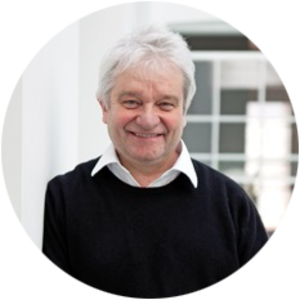
Sir Paul Nurse (Chair), PhD, FRS, FMedSci, HonFREng, HonFBA, MAE
Title: Director, The Francis Crick Institute
Country: UK
Organisation: The Francis Crick Institute
Discipline: Genetics
Sir Paul Nurse chairs the Cancer Grand Challenges Scientific Committee. Sir Paul was awarded the 2001 Nobel Prize in Physiology or Medicine for the discovery of protein molecules that control the division of cells in the cell cycle.
He is Director of the Francis Crick Institute in London, and has served as President of the Royal Society, Chief Executive of Cancer Research UK and President of Rockefeller University. He shared the 2001 Nobel Prize in Physiology or Medicine and has received the Albert Lasker Award, the Gairdner Award, the Louis Jeantet Prize and the Royal Society's Royal and Copley Medals. He was knighted by The Queen in 1999, received the Légion d'honneur in 2003 from France, and the Order of the Rising Sun in 2018 from Japan. He served for 15 years on the Council of Science and Technology, advising the Prime Minister and Cabinet, and is presently a Chief Scientific Advisor for the European Union and a trustee of the British Museum.
He brings to the role of Scientific Committee Chair a lifetime of scientific excellence and intellectual rigour.
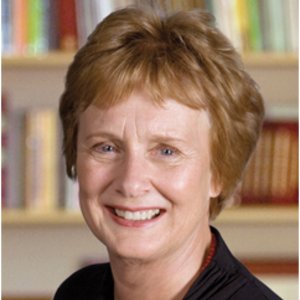
Professor Suzanne Cory, PhD, AC, FAA, FRS
Title: Professor, The Walter and Eliza Hall institute of Medical Research
Country: Australia
Organisation: The Walter and Eliza Hall institute of Medical Research
Discipline: Molecular Genetics
Professor Suzanne Cory, AC, PhD, FAA, FRS is one of the world’s most eminent molecular biologists. An Australian, she was one of the founders of the field of ‘apoptosis’, the study of how cells are programmed to die. Her work showed that cell death is just as important to cancer as cell growth, and her insights continue to have enormous impact in the field today.
Professor Cory is a past president of the Australian Academy of Science, and former Director of the Walter and Eliza Hall Institute of Medical Research in Melbourne. Her many awards include the French decoration of Chevalier de l’Ordre de la Légion d’Honneur, and she has the notable distinction of having had a high school named in her honour.
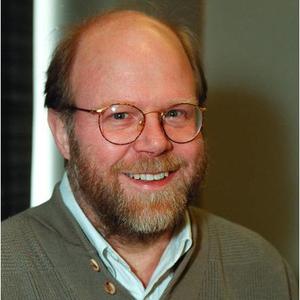
Professor Edward E. Harlow Jnr, PhD
Title: Virginia and D.K. Ludwig Professor of Cancer Research and Teaching, Harvard Medical School
Country: USA
Organisation: Harvard Medical School
Discipline: Molecular Biology, Oncology
Professor Edward E. Harlow Jnr, PhD is Professor of Biological Chemistry and Pharmacology at Harvard Medical School. In the 1980s, Professor Harlow and his colleagues, including Sir David Lane, a fellow Cancer Grand Challenges panellist, were responsible for a major advance in cancer biology, when they discovered that molecules that protect our cells from cancerous changes – called tumour suppressors – are switched off by other molecules that promote the disease.
Professor Harlow has been awarded the American Cancer Society’s Medal of Honor, and has been elected to both the US National Academy of Sciences and the Institute of Medicine. He was a special advisor to the US National Cancer Institute (NCI) Director Harold Varmus, and in that role, set up the NCI Provocative Questions initiative, designed to stimulate risky, early-stage cancer research in the US.
He has a wealth of experience in both academia and industry, the latter as Chief Scientific Officer of Constellation Pharmaceuticals, and has sat on the Scientific Advisory Boards of numerous biotech companies.
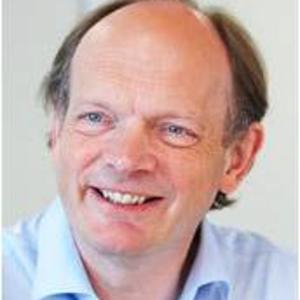
Professor Sir David Lane, PhD, FRS, FRSE
Title: Director, Singapore's Agency for Science, Technology and Research (A*STAR)
Country: UK
Organisation: Singapore's Agency for Science, Technology and Research (A*STAR)
Discipline: Cancer Biology
Professor Sir David Lane, PhD FRS FRSE is one of the world’s most eminent cancer scientists. His discovery of the p53 protein in the 1970s revolutionised our understanding of how cells, including cancer cells, grow and divide. p53, dubbed ‘the Guardian of the Genome’, was the first tumour suppressor found within our cells, and we now know that p53 is faulty or inactivated in the majority of human cancers. Sir David has had a lifelong association with p53 research, and continues to be a leading figure in the field, in terms of both discovery research and drug development.
Formerly Cancer Research UK’s Chief Scientist, Sir David is currently Chief Scientist of Singapore’s Agency for Science, Technology and Research (A*STAR), and Scientific Director of the Ludwig Institute for Cancer Research. Knighted in 2000 for services to science, Sir David is also a Fellow of the Royal Society of London and the Royal Society of Edinburgh.
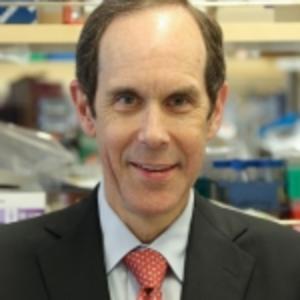
Professor Brian J. Druker, MD
Title: Director, Oregon Health & Science University Knight Cancer Institute
Country: USA
Organisation: Oregon Health & Science University Knight Cancer Institute
Discipline: Cancer Biology, Medicine and Translational Research
Professor Brian J. Druker, MD is a true hero of the cancer field. He is responsible for a revolution in the treatment of cancer through his development of Gleevec, the first drug to target the genetic defects of a particular cancer while leaving healthy cells unharmed. Gleevec is now the treatment of choice for patients with chronic myeloid leukaemia, and has led the way for many more of the targeted drug therapies now in use in the clinic.
Professor Druker heads the groundbreaking Knight Cancer Institute in Oregon, and is the recipient of some of science’s greatest honours, amongst them the Japan Prize, the Lasker-Debakey Clinical Medical Research Award and the Kettering Prize of the General Motors Cancer Research Foundation. He is a member of the US National Academy of Sciences, the Institute of Medicine of the National Academies, and the American Academy of Arts and Sciences and the American Association of Physicians.
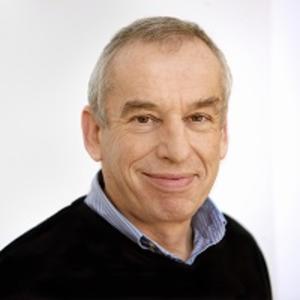
Professor Nic Jones, PhD, FMedSci
Title: Director of Strategic Initiatives, Manchester Cancer Research Centre
Country: UK
Organisation: Manchester Cancer Research Centre
Discipline: Cell biology
Professor Nic Jones formerly served as the Director of the CRUK Manchester Institute and of the CRUK Manchester Major Centre, where he still leads a research team investigating networks of molecules in cells that can help drive cancer development and growth.
Professor Jones’ group are focussing on one particular network that reacts to many different signals - like growth factors - and controls key processes in cells such as when to divide and to self-destruct.
In January 2016, Professor Jones stepped down from the position of CRUK Chief Scientist following 5years in the role. During this time, he helped to shape the life-saving research we fund and translate it into new treatments for patients.
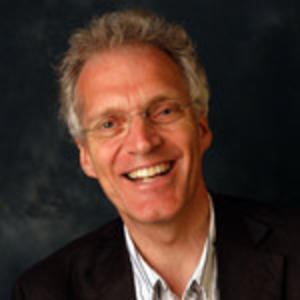
Professor René Bernards, PhD
Title: Group leader, Netherlands Cancer Institute (NKI)
Country: Netherlands
Organisation: Netherlands Cancer Institute (NKI)
Discipline: Molecular Carcinogenesis
René Bernards is a professor of molecular carcinogenesis at the Netherlands Cancer Institute. His laboratory uses functional genomic approaches to find vulnerabilities of cancers that can be exploited therapeutically. Using the concept of synthetic lethality, his laboratory searches for combinations of drugs that are lethal for cancer cells and for vulnerabilities of cancer cells of a defined genotype.
Amongst his honours are the Pezcoller Foundation-FECS Recognition for Contribution to Oncology, the Ernst W. Bertner Award for Cancer Research from the M.D. Anderson Cancer Center, the ESMO Lifetime Achievement Award in Translational Research in Breast Cancer. He is also a member of the Royal Netherlands Academy of Sciences.
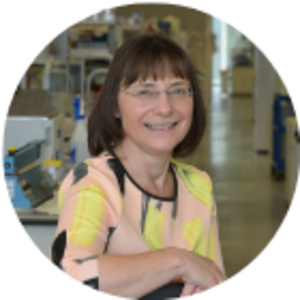
Professor Karen Vousden, PhD, CBE, FRS, FRSE, FMedSci
Title: Cancer Research UK Chief Scientist, Group Leader The Francis Crick Institute
Country: UK
Organisation: Cancer Research UK/The Francis Crick Institute
Discipline: Cancer biology
Professor Karen Vousden is Cancer Research UK's Chief Scientist and a Group Leader at the Francis Crick Institute.
Karen's research focuses on the tumour suppressor protein p53, which plays an important role in cancer prevention. Her lab is interested in understanding the signals that induce p53 and the functions of p53 that contribute to its ability to prevent cancer progression. This work has also expanded to encompass an interest in cancer metabolism. Ultimately, the hope is to be able find ways to translate this research for cancer therapy.
Karen has been elected as a Fellow of the Royal Society, the Royal Society of Edinburgh, the Academy of Medical Sciences, EMBO, the European Academy of Sciences, the American Academy of Arts and Sciences, the American Association of Cancer Research Academy and the National Academy of Sciences.
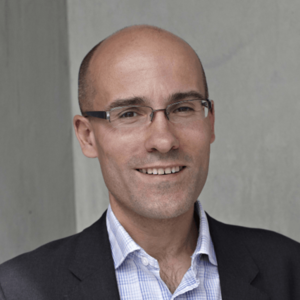
Professor Charles Swanton, MD, PhD, FRS, FMedSci, FRCP
Title: Cancer Research UK Chief Clinician, Group Leader The Francis Crick Institute
Country: UK
Organisation: Cancer Research UK;The Francis Crick Institute
Discipline: Cancer Biology, Medicine and Translational Research
Professor Charles Swanton is the Chief Investigator of the CRUK TRACERx clinical study to decipher lung cancer evolution and is co-director of the CRUK Lung Cancer Centre of Excellence.
His multidisciplinary team at The Francis Crick Institute discovered that HLA loss of heterozygosity, cancer cytotoxics, DNA replication stress, cancer genome doubling events and the APOBEC3B cytidine deaminase precipitate cancer diversity, accelerating cancer evolution, providing the substrate for cancer drug resistance and treatment failure.
Charles was appointed Fellow of the Academy of Medical Sciences in 2015. He has been awarded the Stand Up To Cancer Translational Cancer Research Prize, Glaxo Smithkline Biochemical Society Prize, San Salvatore Prize for Cancer Research and the Ellison-Cliffe Medal, Royal Society of Medicine. He was elected to become an EMBO member in 2017.
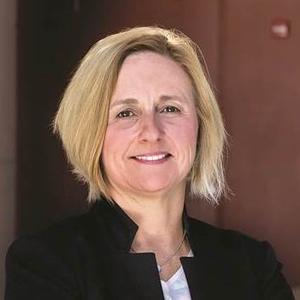
Professor Crystal Mackall, MD
Title: Ernest and Amelia Gallo Family Professor of Paediatrics & Medicine, Stanford University
Country: USA
Organisation: Stanford University
Discipline: Immunology, Clinical
Professor Crystal Mackall, MD is the Ernest and Amelia Gallo Family Professor of Paediatrics & Medicine at Stanford University. She serves as Founding Director of the Stanford Center for Cancer Cell Therapy, Associate Director of Stanford Cancer Institute, and Director of the Parker Institute for Cancer Immunotherapy at Stanford. During a 27 year tenure culminating as Chief of the Paediatric Oncology Branch, NCI, and now at Stanford, she has led an internationally recognised translational research program.
She is credited with defining the major pathways of T cell homeostasis and has conducted numerous first-in-human and first-in-child clinical trials spanning dendritic cell vaccines, cytokines, and adoptive immunotherapy. Her group was among the first to demonstrate impressive activity of CD19-CAR in pediatric leukemia, developed a novel CD22-CAR that demonstrates impressive activity and has identified major pathways of resistance to CAR therapies.
She has published over 185 manuscripts and serves in numerous national leadership positions, including Chair of the NCI Paediatric Cancer Immunotherapy Trial Network, and co-Leader of the St. Baldrick’s-StandUp2Cancer Paediatric Dream Team. She is Board Certified in Paediatrics, Paediatric Haematology-Oncology and Internal Medicine.
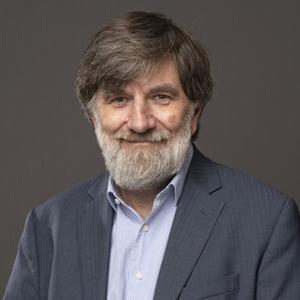
Professor David Hunter MBBS, MPH, ScD, FRACPHM
Title: Richard Doll Professor of Epidemiology and Medicine, University of Oxford
Country: UK
Organisation: University of Oxford
Discipline: Epidemiology
Professor David Hunter studied medicine at the University of Sydney, before moving to Harvard University where he was the Vincent L. Gregory Professor of Cancer Prevention. He is the Richard Doll Professor of Epidemiology and Medicine, and Director of the Harvard-Oxford Program in Epidemiology. His early research was on HIV transmission in East Africa, and has been involved in collaborative studies of nutrition and HIV pathogenesis.
As Director of the Harvard Center for Cancer Prevention he developed a sample handling and genotyping laboratory to explore genetic associations with cancer, and gene-environment interactions. He founded the Program in Genetic Epidemiology and Statistical Genetics at Harvard. He was co-chair of the steering committee of the NCI Breast and Prostate Cancer Cohort Consortium (BPC3) between 2003 and 2012, was co-director of the NCI Cancer Genetic Susceptibility Markers project focused on genome-wide association studies, and was an Eminent Scholar at the NCI between 2004 and 2009.
From 2009-2016 he was Dean for Academic Affairs at the Harvard TH Chan School of Public Health, and in 2015-2016 he was Acting Dean. He is one of about 3,000 “highly cited researchers” worldwide according to Thomson-Reuters.
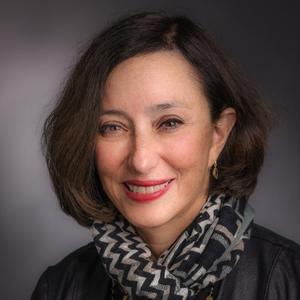
Professor Judy E. Garber, MD, MPH
Title: Director Center for Cancer Genetics and Prevention, Dana-Farber Cancer Institute
Country: USA
Organisation: Dana-Farber Cancer Institute
Discipline: Epidemiology, Clinical
Professor Judy Garber is the Susan F. Smith Chair and Chief of the Division of Cancer Genetics and Prevention at Dana-Farber Cancer Institute and a Professor of Medicine at Harvard Medical School.
Professor Garber is a leader in research into characterising and treatment of triple negative or basal-like breast cancer and an expert in Li-Fraumeni Syndrome. Her translational research focuses on the evaluation of novel agents targeting DNA repair defects in breast cancer.
Professor Garber is a past president of the American Association for Cancer Research (AACR). She serves on the National Cancer Advisory Board of the National Cancer Institute and was elected into the National Academy of Medicine in 2013. She also serves as the Co-Scientific Director of the Breast Cancer Research Foundation and past chair of the Breast Cancer Research Foundation Scientific Advisory Board. She is an ASCO Statesman and a Fellow of the AACR Academy.

Sir Paul Nurse (Chair), PhD, FRS, FMedSci, HonFREng, HonFBA, MAE
Director, The Francis Crick Institute

Professor Suzanne Cory, PhD, AC, FAA, FRS
Professor, The Walter and Eliza Hall institute of Medical Research

Professor Edward E. Harlow Jnr, PhD
Virginia and D.K. Ludwig Professor of Cancer Research and Teaching, Harvard Medical School

Professor Sir David Lane, PhD, FRS, FRSE
Director, Singapore's Agency for Science, Technology and Research (A*STAR)

Professor Brian J. Druker, MD
Director, Oregon Health & Science University Knight Cancer Institute

Professor Nic Jones, PhD, FMedSci
Director of Strategic Initiatives, Manchester Cancer Research Centre

Professor René Bernards, PhD
Group leader, Netherlands Cancer Institute (NKI)

Professor Karen Vousden, PhD, CBE, FRS, FRSE, FMedSci
Cancer Research UK Chief Scientist, Group Leader The Francis Crick Institute

Professor Charles Swanton, MD, PhD, FRS, FMedSci, FRCP
Cancer Research UK Chief Clinician, Group Leader The Francis Crick Institute

Professor Crystal Mackall, MD
Ernest and Amelia Gallo Family Professor of Paediatrics & Medicine, Stanford University

Professor David Hunter MBBS, MPH, ScD, FRACPHM
Richard Doll Professor of Epidemiology and Medicine, University of Oxford

Professor Judy E. Garber, MD, MPH
Director Center for Cancer Genetics and Prevention, Dana-Farber Cancer Institute
Cancer Grand Challenges Advocacy Panel
Cancer Grand Challenges is committed to the belief that research intended to benefit patients is improved by involving people affected by cancer.
To bring this perspective to Cancer Grand Challenges, a group of patient representatives take part in ongoing consultations to shape the initiative. They review applications and work with funded teams to develop the patient involvement aspect of their research.
They will continue to share their ideas and advice throughout the Cancer Grand Challenges process
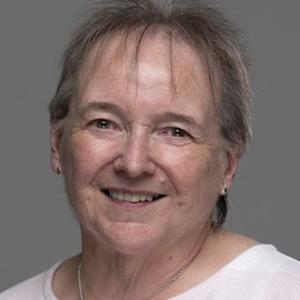
Margaret Grayson (Chair)
A native of Belfast, Margaret works extensively with cancer organisations as a personal and public involvement (PPI) representative. Margaret currently chairs the Cancer Grand Challenge Advocacy Panel, having been the deputy chair previously. She also chairs the Northern Ireland Cancer Research Consumer Forum, working with the NI Cancer Trials Network and is a lay member of their Executive Committee.
Margaret is a member of the NCRI Consumer Forum and represents Northern Ireland on the Consumer Involvement Advisory Group. She is an active partner in several Trial Management Groups and also a co-applicant on a Health Technology Assessment trial, as well as being a member of Independent Cancer Patient Voice (ICPV), and a facilitator for HSC, Public Health, Research and Development Division’s Building Research Partnerships workshop. She has been a member of Cancer Research UK’s Research and Innovation Cancer Insight Panel and been involved in many of Cancer Research UK’s PPI activities.
Margaret was awarded the MBE for services to cancer research in the Queen's Birthday 2018 Honours List.
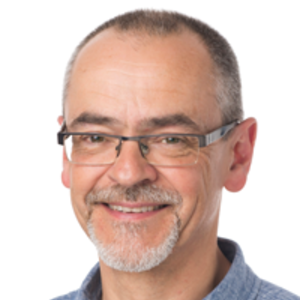
Jim Elliot
After his experience caring for close relatives who’d had a cancer diagnosis, Jim Elliott got involved in cancer research as a way of giving something back, and to find out more about the research that underpins all cancer treatment. He’s particularly interested in Cancer Grand Challenges due to its potential to focus attention on hard to answer questions that would be unlikely to be addressed otherwise. Jim has a broad range of skills and experiences that will allow him to bridge the gap between scientists and the public, and help frame the science in ways that will resonate with multiple audiences.
Jim has a number of public involvement roles related to cancer. He is a Cancer Research UK Public Involvement Coach, a member of Independent Cancer Patients’ Voice, a lay facilitator for Building Research Partnerships workshops, and a lay reviewer for the National Institute for Research with a particular focus on cancer. He has also been a member of a cancer patient and carer panel for an NHS trust.
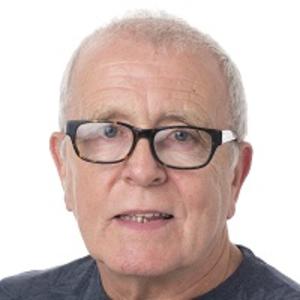
Terry Kavanagh
Terry has been on the Cancer Grand Challenges Advocacy Panel since its inception, having attended the formative Big Thinks in both London and Edinburgh when the initiative began. He is also a member of the Cancer Research UK Cancer Insights Panel for Research and Strategy. As a lung cancer patient with close connections to the Roy Castle Lung Cancer Foundation, he is the patient representative on the United Kingdom Lung Screening Trial (UKLS Trial). Terry loves the way that Cancer Grand Challenges motivates researchers to ''take cancer on' and challenge themselves, and reach out to try and break down the barriers to finding a cure for cancer.
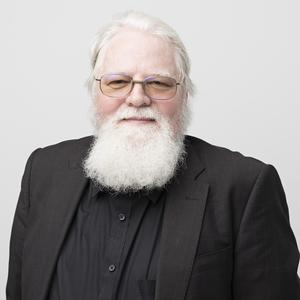
Jeremy Dearling
Jeremy has been involved in supporting research through patient and public involvement (PPIE) for many years, working with PPIE groups and on an individual basis. He has personal experience of caring for his wife through 3 cancers, which were treated with chemotherapy, surgery and radiotherapy. Jeremy has also been a hospital patient himself and worked in the NHS, bringing a range of viewpoints to his role on the patient advisory panel.
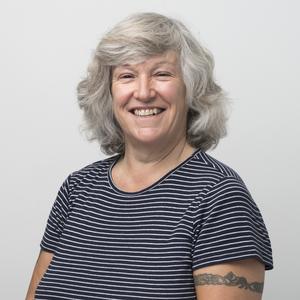
Debby Lennard
Debby was diagnosed with colorectal cancer in 2014 and during her treatment took part in several research trials. This sparked an ongoing interest in health research.
She sits as a public or lay member on several National Institute for Health Research (NIHR) panels and boards, and is also a member of the NICE Coloectal Cancer Guideline Committee.
She is a co-applicant on two cancer trials funded by Cancer Research UK and Macmillan, and also runs a Community of Interest Company (CIC) called Help-Diabetes, offering support for people with Type 2 Diabetes.
Her work with Cancer Research UK has included being a member of one a sounding boards, acting as an Involvement Coach, and many other involvement roles. She currently is working on the Data Intelligence Group. She feels that being part of the Cancer Grand Challenges Advocacy Panel is a highlight and an exciting opportunity to help shape significant and potentially game changing pieces of research.
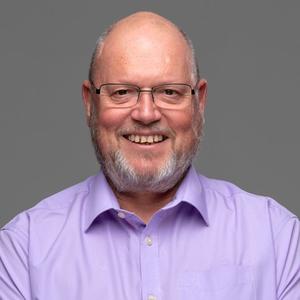
Richard Stephens
Now in his third decade as a patient advocate, Richard has had successful professional careers in teaching, journalism and local government. He was a carer for both his parents during terminal cancers, and has survived two cancers himself, and a heart emergency, with subsequent late effects and co-morbidities. He has participated in 13 research studies, including 4 interventional trials.
Richard chaired the NCRI Consumer Forum and now chairs the Stakeholder Forum for BBMRI-ERIC (European biobanking research infrastructure). He also sits on groups for National Institute of Health Research, NHS England, PHE-NCRAS (Public Health England-National Cancer Registration and Analysis Service), Genomics England and the Association of British Pharmaceutical Industry, and works with industry and patient groups in the UK, Europe and Canada. He is co-Editor-in-Chief of the Journal of Research Involvement and Engagement.
Richard has worked with Cancer Research UK since the charity was founded and is a Patient Advocate on Cancer Grand Challenges STORMing Cancer team.
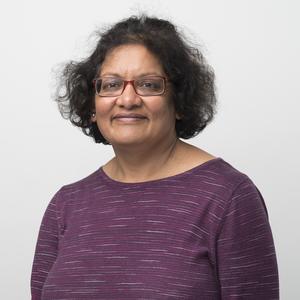
Gita Patel
Gita has been involved with various CRUK Patient and Public Involvement activities for a number of years. She has worked within the NHS throughout her career, leaving when her son was diagnosed with Ewing's sarcoma in 2012. Having gone through chemotherapy, proton therapy, stem cell transplant and participation in a clinical trial, sadly, they lost him in 2015.
Gita recognises that ongoing research allowed her son to access all the treatments. Gita provides a carer's perspective to the parental and bone cancer groups that she is involved with.

Claire James
Following an unexpected diagnosis of myeloma in 2014, Claire continued working. In June 2015, she was also diagnosed with HER2+ breast cancer. Following a year of breast cancer treatment, she returned to full-time work, but left in 2017. Claire now volunteers for public involvement activities to use the skills gained during employment to support vital initiatives like Cancer Grand Challenges.
Claire is sports mad and competes in half marathons. She ran every day during chemotherapy for breast cancer and loves helping people gain enjoyment from running. She swims regularly and enjoys many other sports. Sport helps her to deal with the stress of living with myeloma.
Since becoming interested in volunteering Claire has taken on everal public involvement roles, including being part of the Cancer Grand Challenges Advocacy Panel and working with Genomics Partnership Wales, which delivers the Welsh Government’s Genomics for Precision Medicine strategy. She has also been involved in the CRUK-RCGP (Royal College of General Practitioners) partnership which aims to improve early diagnosis rates; the Royal College of Radiology’s working group responsible for developing professional guidance on the Duty of Candour and several research study steering groups for Cardiff University.
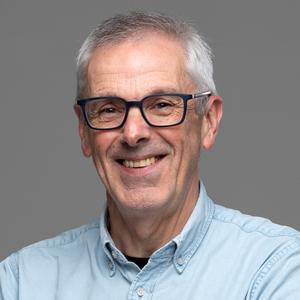
Patrick McGuire
Following the death of his wife from bowel cancer, aged just 52, Patrick was determined to do whatever he could to try to ensure that as few families as possible went through the devastating experience him, his wife and children went through.
Patrick began volunteering and fundraising for Cancer Research UK. Over the years he’s become involved in a range of patient and public involvement opportunities, including focus groups, advisory boards, working parties and research groups. He’s been a CRUK Cancer Campaigns Ambassador for 7 years and is currently a member of the CRUK Policy Insights Panel and the CRUK-RCGP (Royal College of General Practitioners) Steering Group. He is a member of the NHS Cancer Programme Patient and Public Voices Forum and a member of the Francis Crick Institute Patient Advisory Panel. He is particularly passionate about cancer prevention and early diagnosis. Patrick feels proud and privileged to be a member of the Cancer Grand Challenges Advocacy Panel, which gives him the opportunity to play a part in making a real difference and transforming lives.
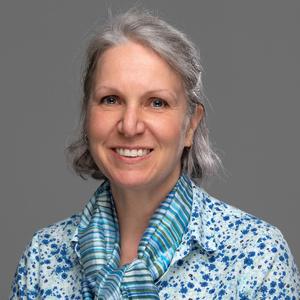
Danielle Horton-Taylor
Danielle is a parent and carer. Her involvement began as one of the first lay members of the National Cancer Research Institute's Children's Cancer and Leukaemia Clinical Study Group. She is a founding member of both PORT (Paediatric Oncology Reference Team) and UNITE2CURE (a network calling for better treatment for children and young people with cancer). She co-chairs the European Society for Paediatric Oncology ACCELERATE Long Term Follow Up Working Group and is part of the TRECA (Trials Engagement in Children and Adolescents) Study Advisory Group. She’s interested in a range of paediatric oncology trial matters, including patient information and ethics.
She has been a member of the Cancer Grand Challenges Advocacy Panel since its inception. She is keen to ensure children's cancer is high on the agenda so that more children survive their cancers, and with fewer long-term side effects.
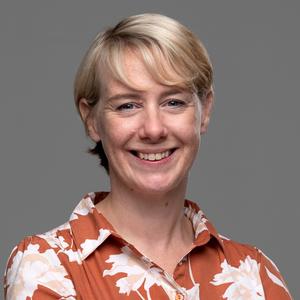
Claire Flatt
Claire was just 33 years old when she was diagnosed with both breast and cervical cancer in August 2017. Claire underwent 18 months of treatment for both cancers and returned to work in January 2019. Since then Claire has found a new passion in fundraising for cancer charities and now takes on a new challenge every year. Claire took up running during chemotherapy in 2018 and managed to complete the London Marathon less than 9 months later. Her challenge for 2020 is to climb Mount Kilimanjaro with her husband.
As a registered nurse and lecturer. Claire is also passionate about using her experience as a patient to raise awareness around cancers in younger adults. She is also interested in public and patient involvement in research and service redesign and is an NHS Citizen Leader. This is her first public patient involvement role - she is looking forward to seeing what can be achieved.
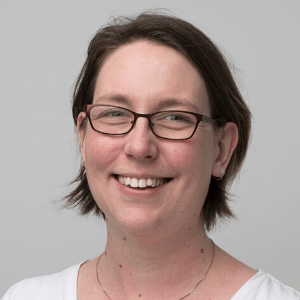
Sarah Mayman
Sarah became a carer for her son, Joseph, when he was diagnosed with a childhood cancer called neuroblastoma in 2012, until his death from the disease in 2017. After losing her son, she became inspired about improving outcomes and treatments for people facing cancer.
Sarah recognises that her experience as a carer enables her to bring a unique perspective to her role as a patient representative, and believes that we all need to work together to achieve the most effective results. She saw how research led to opportunities for Joseph's care and treatment and hopes to contribute to further research by sharing her insight.

